Arpeggio from Afar
Believing in the power of music, renowned conductor Kobayashi Kenichiro dedicates each of his concerts to peace in Ukraine, while recalling World War II and the years he spent in Eastern Europe.
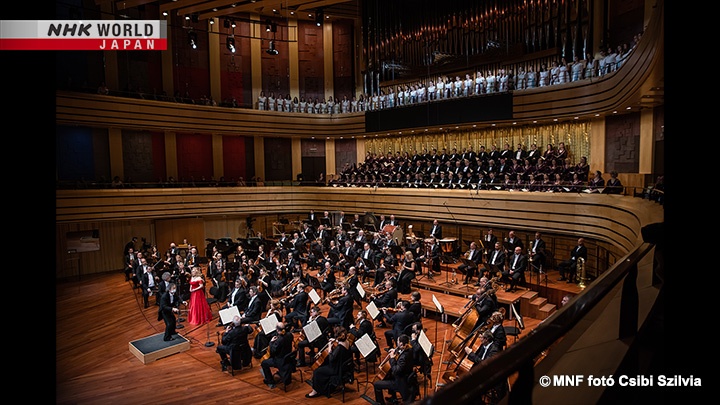
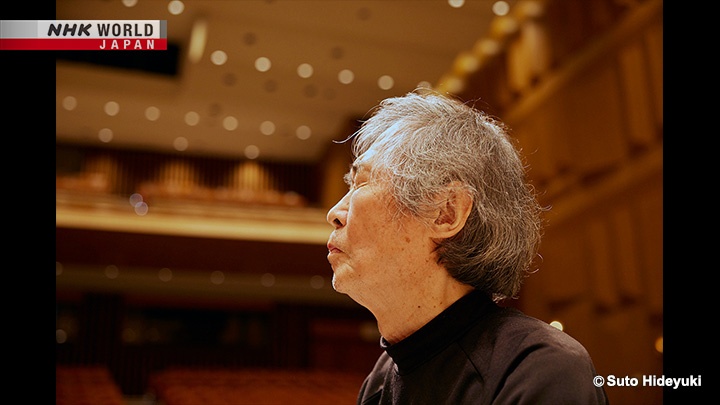
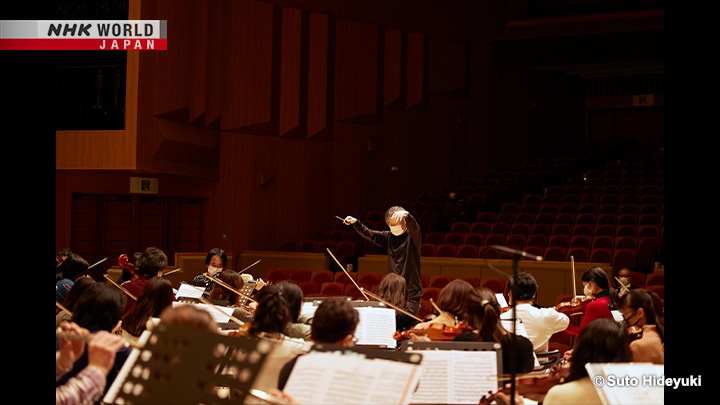
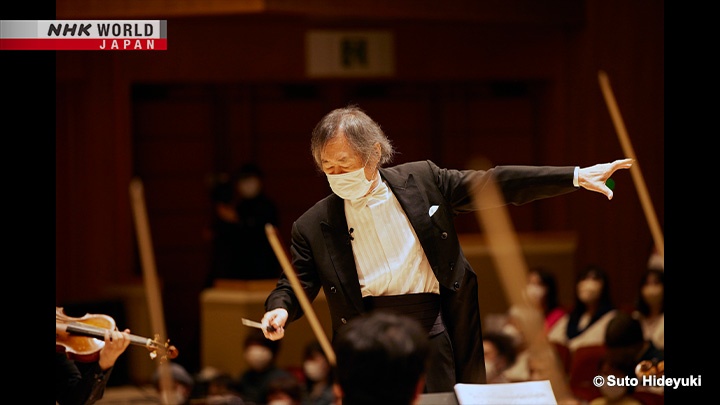
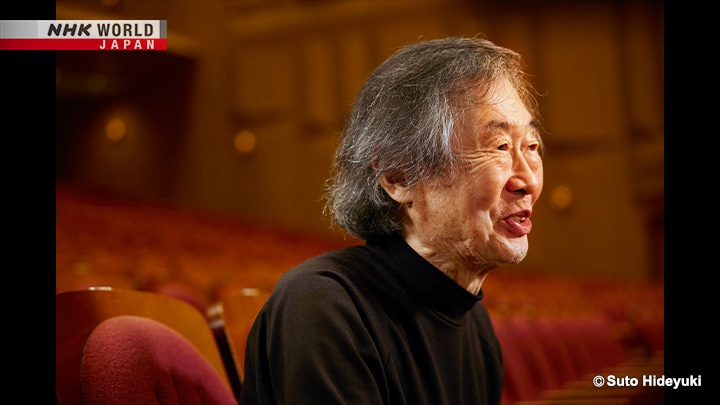
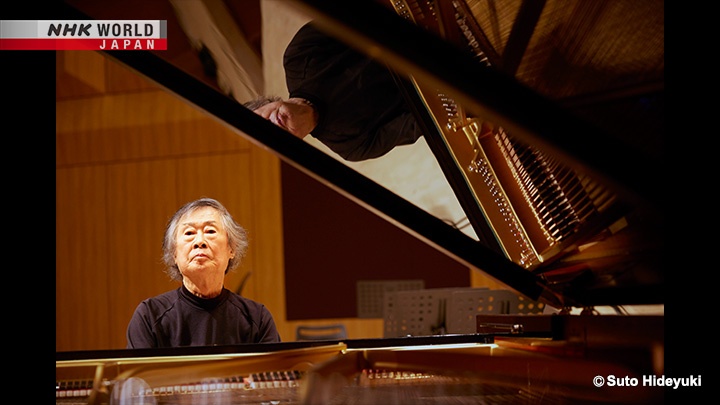
Transcript
"Kobayashi Kenichiro
Conductor
Born in 1940."
"April 8, 2022
Kobayashi is preparing for
tomorrow's concert."
The second movement of Mozart's
Piano Concerto No. 23.
I think it's the perfect piece to let us
feel for the situation in Ukraine.
I had an opportunity to
go through this piece
with the former empress.
She had performed it with us before,
and later, at our concert, she said,
"Ah, Kobaken, so that's how
it should be played."
I'll always remember that.
I also remember her telling me,
"In times of grief, sympathy can be
conveyed through your music."
"February 24, 2022
Russian invasion of Ukraine."
"What Japanese artists think."
"One month earlier
March 11, 2022
Ikebukuro, Tokyo."
"Kobayashi's desire to help Ukraine
is tangible at each concert"
At the concert for Ukraine,
we played Sibelius' Finlandia,
and the highlight is the hymn,
when the chorus joins in.
Conducting the chorus,
that was fun.
This part, for instance.
There were many former glee club
members, from Waseda and Keio,
a lot of them in their 70s,
and they became one
through song, rallying us
to stand up once more,
to escape suffering.
I saw...
a kind of grace, on the face
of each performer.
Some were tearing up,
others were lost in the beauty
of the music,
this sublimity, that's what I
urgently wish to convey.
"Kobayashi chose Finlandia,"
"a symphonic poem by
Finnish composer Jean Sibelius."
"that conveys hope for the independence
of a land suffering under Russian rule."
"Kobayashi won first place at the
1st International Conductor Competition
in Budapest. (1974)"
"He has since conducted several European
orchestras, including the Hungarian National
Philharmonic Orchestra,"
"and is one of Japan's most renowned conductors."
I was, this young conductor, sort of
crawling around the Communist Bloc,
and every time, I felt, keenly,
that the suffering would not end.
But then I sensed something like
the spirit of Hungary, I guess,
their memories of orchestral sounds
from halcyon days,
and that brought me great joy.
I've conducted Russian orchestras
several times.
I've also worked with
Russian pianists, violinists, and so on...
They were all good people.
Now is the time for us to
help each other get better,
to deepen friendships,
to show more love. Right?
What on earth is making them
kill and steal land from others?
Their leaders are
forsaking everything
in pursuit of personal interests,
and when that happens,
no reparations can ever be made.
I'm sorry, cellists,
yes, bass cellists,
I need a stronger beat from you.
It sounds a bit slack right now,
give me more beat!-rest-beat!-rest.
From the top-
Tomorrow, on the day of
the concert, I'll be 82 years old.
I've lived a long time,
but when I...
Ukraine was always close by
on those tours, and
I have so many memories
of that time.
If I could, through the music.
share those memories
with the audience, and somehow
get them to care
more deeply about Ukraine,
that would be wonderful.
"His first encounter with music, during WWⅡ."
I recall a time, it felt like days,
when the sky was full of B-29s.
My father and I would run to
the air raid shelter.
There was a naval bombardment
of the Hitachi coast.
I was just a child, so it just
looked like fireworks to me.
So in my memories, the war was...
more idyllic than tragic, you could say.
The situation in Ukraine is
completely different, of course.
But back to my story-
We had evacuated to the countryside,
where the roar of B-29s didn't reach.
In the moments of peace and quiet,
my father, who was a school teacher,
took me to his school, and one day,
he played "Tsuki no sabaku" for me.
I was two or three, and at first
I didn't care much for the song,
but suddenly,
my father played this arpeggio,
and somehow, I remember
the feeling of that moment.
He was playing rather calmly,
and then,
there was the arpeggio.
I was astounded.
Encountering such beauty was
what inspired me to become a musician.
Good morning.
"One of the pieces Kobayashi selected
is Pablo de Sarasate's Zigeunerweisen,"
"a composition filled with the
melancholy of the Romani people."
The sense of sorrow stays
with you throughout,
then in the final movement,
there's a triumphant turn.
I chose Zigeunerweisen to make
people believe that someday,
surely, conscience will prevail
in the hearts of everyone.
"Sezaki Asuka
Violin Soloist."
"April 27, 2022
Kobayashi travels to Hungary for a concert tour."
"Ukraine lies just beyond the eastern border."
It's a beautiful,
early summer day.
It hurts to think that right now,
so many people in Ukraine are
suffering because of the invasion.
They don't know when
the next bomb will come.
"11 days were set aside for rehearsals during
Kobayashi's month-long stay."
"From May 2, Kobayashi conducted the
Hungarian National Philharmonic and three other
orchestras in a total of six concerts."
"Donations from concerts in Japan went toward
helping Ukrainian refugees in Hungary get food
and shelter."
The air feels different.
I felt it as soon as
I got off the plane.
I think that now, I can create music
that will move people more.
I think the audience really wanted that.
Their applause sounded different.
And they yelled so many bravos,
which never happened before...
I think they were expressing
their gratitude for the music,
as well as their sympathy
for those who are suffering.
It was a peculiar kind of
collective prayer, perhaps,
that took a form of
a concert like no other.